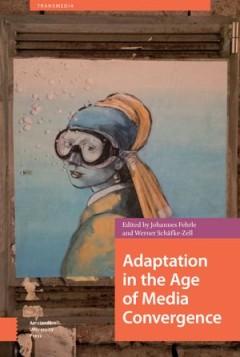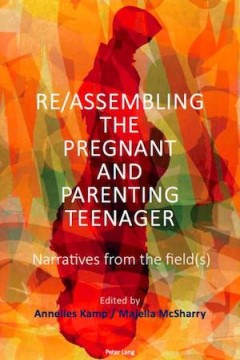Filter by

Adaptation in the Age of Media Convergence
This collection considers new phenomena emerging in a convergence environment from the perspective of adaptation studies. The contributions take the most prominent methods within the field to offer reconsiderations of theoretical concepts and practices in participatory culture, transmedia franchises, and new media adaptations. The authors discuss phenomena ranging from mash-ups of novels and Yo…
- Edition
- -
- ISBN/ISSN
- 9789462983663
- Collation
- -
- Series Title
- -
- Call Number
- -

The Believer and the Modern Study of the Bible
The Mishna Berura is, without a doubt, Rabbi Israel Meir Kagan's greatest and most complex contribution to the canon of Orthodox Jewish Law; it is a singular work that synthesizes Jewish traditions, laws, and mores into a practical halakhic guide to daily religious life. For all of his traditionalism, Rabbi Kagan was an iconoclast, and the Mishna Berura broke from many of the traditional approa…
- Edition
- -
- ISBN/ISSN
- 9781618112781
- Collation
- -
- Series Title
- -
- Call Number
- -

The Believer and the Modern Study of the Bible
The essays in this volume address the conundrum of how Jewish believers in the divine character of the Sinaitic revelation confront the essential questions raised by academic biblical studies. The first part is an anthology of rabbinic sources, from the medieval period to the present, treating questions that reflect a critical awareness of the Bible. The second part is a series of twenty-one es…
- Edition
- -
- ISBN/ISSN
- 9781618119513
- Collation
- -
- Series Title
- -
- Call Number
- -

Babel' In Context A Study in Cultural Identity
Isaak Babel (1894–1940) is arguably one of the greatest modern short story writers of the early twentieth century. Yet his life and work are shrouded in the mystery of who Babel was—an Odessa Jew who wrote in Russian, who came from one of the most vibrant centers of east European Jewish culture and all his life loved Yiddish and the stories of Sholom Aleichem. This is the first book in Engl…
- Edition
- -
- ISBN/ISSN
- 9781618118530
- Collation
- -
- Series Title
- -
- Call Number
- -

Re/Assembling the Pregnant and Parenting Teenager Narratives from the Fiel
Drawing in contributions from the United States, the United Kingdom and Republic of Ireland and Aotearoa New Zealand, this book seeks to foreground shifting experiences of teenage pregnancy and parenting in time and space. In the process, the work cuts across enduring ‘stigma' contests and dominant discourses which seek to capture, understand and render fixable the ‘problem' of teen…
- Edition
- -
- ISBN/ISSN
- 9781787075139
- Collation
- -
- Series Title
- -
- Call Number
- -

Winchester: An Archaeological Assessment Swithun's 'City of Happiness and Go…
This critical assessment of the archaeology of the historic city of Winchester and its immediate environs from earliest times to the present day is the first published comprehensive review of the archaeological resource for the city, which as seen many major programmes of archaeological investigation. There is evidence for activity and occupation in the Winchester area from the Palaeolithic per…
- Edition
- -
- ISBN/ISSN
- 9781789258943
- Collation
- -
- Series Title
- -
- Call Number
- -

Westward on the High-Hilled Plains The Later Prehistory of the West Midlands
The West Midlands has struggled archaeologically to project a distinct regional identity, having largely been defined by reference to other areas with a stronger cultural identity and history, such as Wessex the South-West, and the North. Only occasionally has the West Midlands come to prominence, for instance in the middle Saxon period (viz. the kingdom of Mercia), or, much later, with rural s…
- Edition
- -
- ISBN/ISSN
- 9781789256512
- Collation
- -
- Series Title
- -
- Call Number
- -

West Cotton, Raunds A Study of Medieval Settlement Dynamics AD 450-1450. Exc…
The open area excavation of nearly a half of the small deserted medieval hamlet of West Cotton, Raunds, Northamptonshire has revealed the dynamic processes of constant development in a way that has rarely been achieved on other comparable sites in England. Its origins have been seen to lie in the mid tenth-century plantation of a planned settlement based on regular one-acre plots, which occurre…
- Edition
- -
- ISBN/ISSN
- 9781842177587
- Collation
- -
- Series Title
- -
- Call Number
- -

Right Across the World: The Global Networking of the Far-Right and the Left R…
In a post-Trump world, the right is still very much in power. Significantly more than half the world’s population currently lives under some form of right-wing populist or authoritarian rule. Today’s autocrats are, at first glance, a diverse band of brothers. But religious, economic, social and environmental differences aside, there is one thing that unites them - their hatred of the libera…
- Edition
- -
- ISBN/ISSN
- 9781786808554
- Collation
- -
- Series Title
- -
- Call Number
- 320 LEF r

Feminist Solutions for Ending War
War is a man’s game,’ or so goes the saying. Whether this is true or not, patriarchal capitalism is certainly one of the driving forces behind war in the modern era. So can we end war with feminism? This book argues that this is possible, and is in fact already happening. Each chapter provides a solution to war using innovative examples of how feminist and queer theory and practice inform p…
- Edition
- -
- ISBN/ISSN
- 9780745342900
- Collation
- -
- Series Title
- -
- Call Number
- 320 FEM f
 Computer Science, Information & General Works
Computer Science, Information & General Works  Philosophy & Psychology
Philosophy & Psychology  Religion
Religion  Social Sciences
Social Sciences  Language
Language  Pure Science
Pure Science  Applied Sciences
Applied Sciences  Art & Recreation
Art & Recreation  Literature
Literature  History & Geography
History & Geography